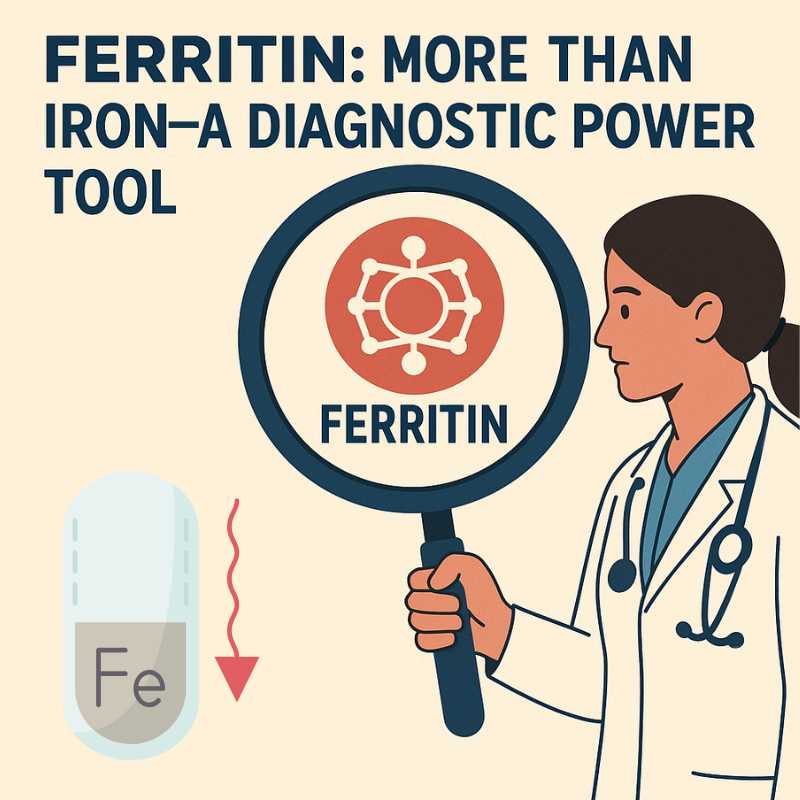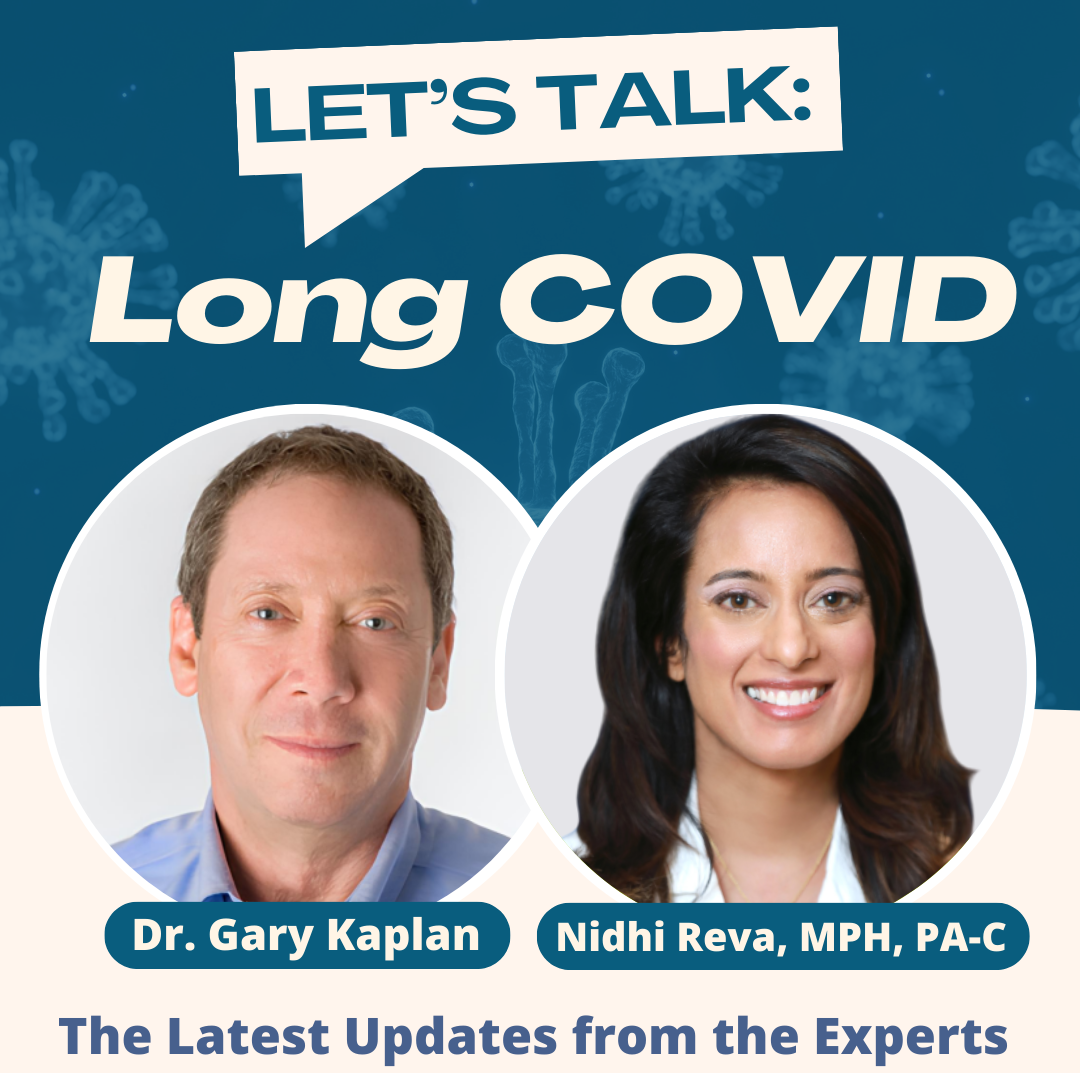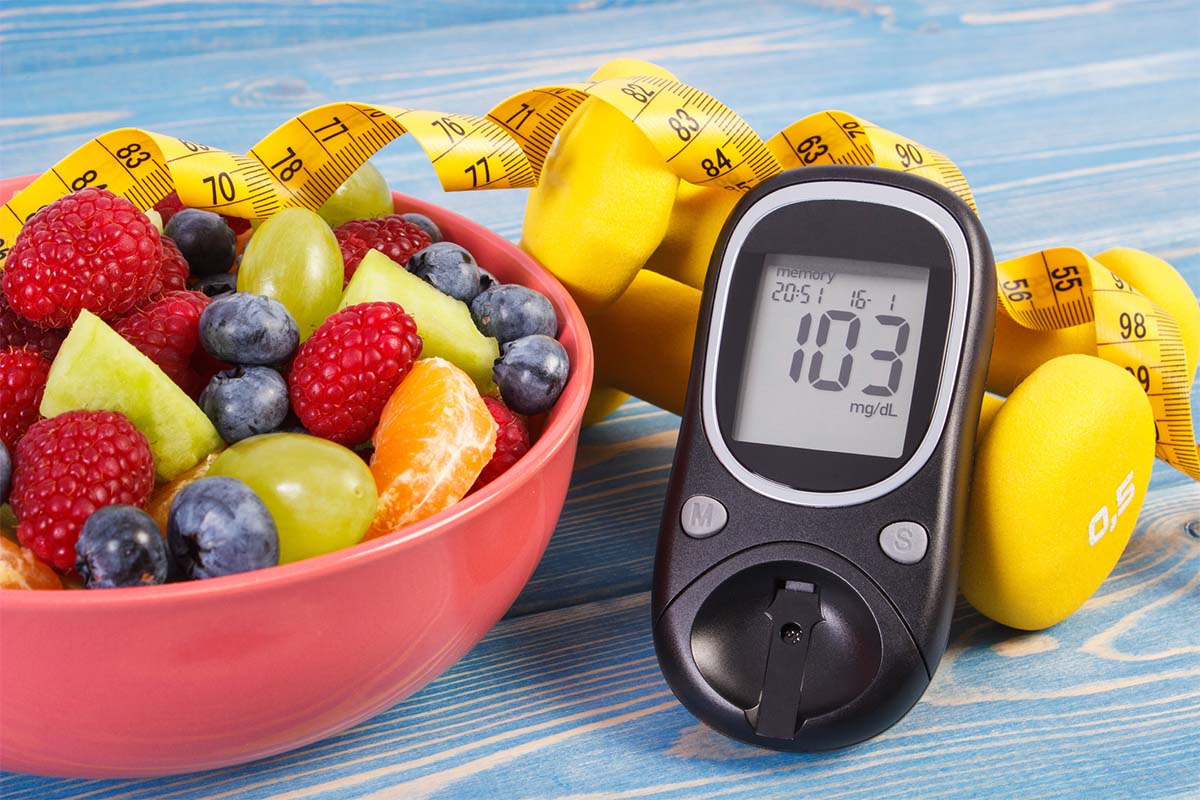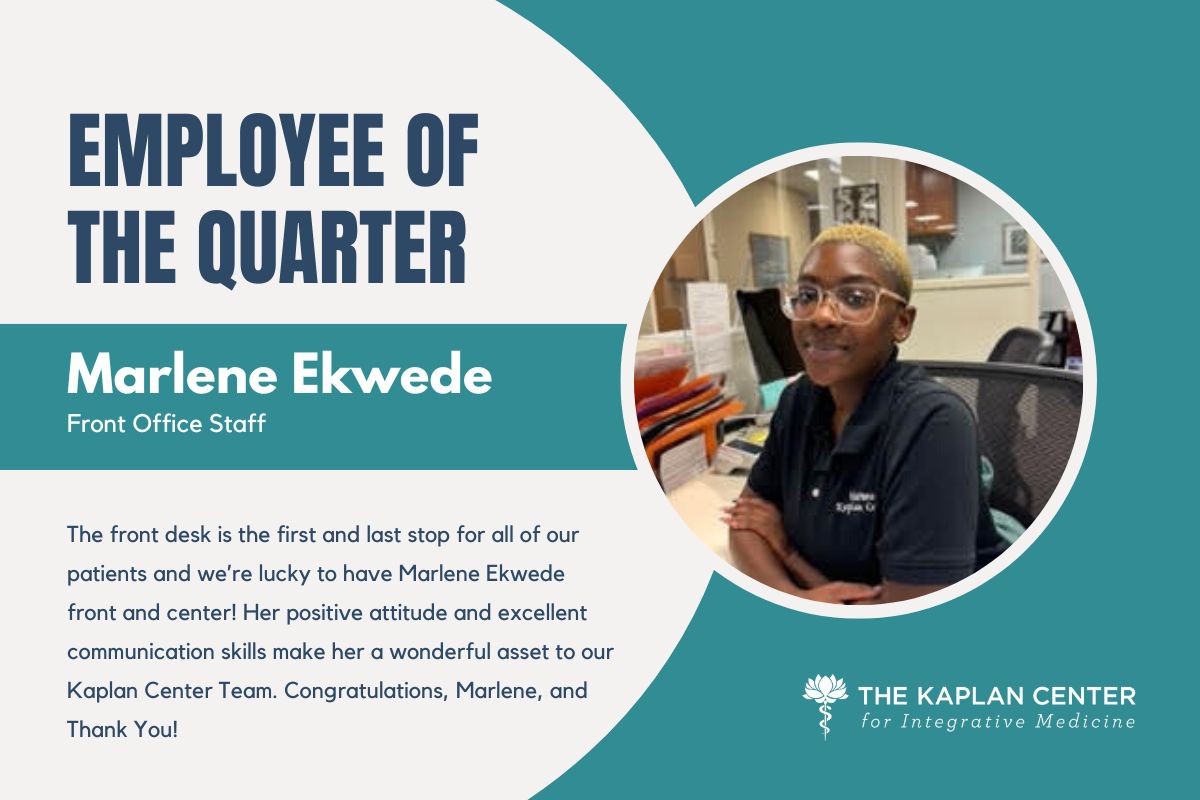
“I Kept Bracing Myself for a Crash”: A Long COVID Recovery Story
July 17, 2025/by Nidhi Reva
Why I Keep Going Back
July 9, 2025/by Nidhi Reva
Acupuncture for Headaches: A Holistic Approach to Lasting Relief
June 30, 2025/by Rebecca Berkson, L.Ac, Dipl.OM
Ferritin: More Than Iron—A Diagnostic Power Tool
June 24, 2025/by Nidhi Reva
“Not All in Her Head”: Callie’s Story of Seizures, Strength, and Starting Over
June 19, 2025/by Nidhi Reva
An Important Reminder From Nurse Nan: Save Your Tick
June 17, 2025/by Nan Kinder, RN
“I Think I’m Losing My Mind”: When Treating Tick-Borne Illness Feels Worse Before It Gets Better
June 12, 2025/by Nidhi Reva
A Patient’s Story: From Pushing Herself to Be Stronger—To Acceptance
June 12, 2025/by Nidhi Reva
Long COVID Webinar and Q&A
June 3, 2025/by Kaplan Center
Good Morning Washington Visits the Kaplan Center! Part 2
June 2, 2025/by Kaplan Center
Good Morning Washington Visits The Kaplan Center! Part 1
May 13, 2025/by Kaplan Center
Which Respiratory Infection Do You Have?
December 10, 2024/by Kaplan Center
Eating “Right” But Feeling Wrong? The Problem with One-Size-Fits-All Diets and Blood Sugar
December 4, 2024/by Kaplan Center
Nutrition Tips for Thyroid Health
November 21, 2024/by Kaplan Center
4 Ways to Practice Gratitude During the Holidays
November 21, 2024/by Gary Kaplan, DO
Out of the Fog: Strategies to Prevent Brain Fog and Sharpen Cognitive Function
November 19, 2024/by Kaplan Center
Employee of the Quarter: Marlene Ekwede
October 28, 2024/by Kaplan Center
Stop Eating These Foods And Clear Up Your Brain!
October 28, 2024/by Gary Kaplan, DO
8 Tips To Help You Manage Your Medications
October 21, 2024/by Gary Kaplan, DO
Preventing & Treating Osteoporosis with Yoga, Resistance Training, Diet, & Medications
October 14, 2024/by Lisa Lilienfield, MDAre you looking to improve your overall wellness?
Personalized care you can trust.
Our integrative, non-surgical treatment approach is highly successful in maintaining wellness and also treating chronic pain and illness. For more than 30 years, we have delivered superior, cutting-edge health care in the Washington, DC area.
QuickLinks
Contact Information
Tel: 703-532-4892
Fax: 703-237-3105
6829 Elm Street, Suite 300
McLean, Virginia 22101
Map It
Hours of Operation
Mon – Thu : 8 am – 5 pm, ET
Fri : 8 am – 12 pm, ET
Adrenal Fatigue Could Be Why You’re So Tired
/in Conditions, Hormone Health, Wellness/by Kaplan CenterThe adrenals are two small glands located above your kidneys. Despite their small size, they carry a lot of weight in making sure your body is functioning properly. These two small glands are responsible for secreting hormones that help regulate your metabolism, immune system, blood pressure, and your body’s response to stress.
How the adrenals work
When high-stress situations arise, your body’s innate “alarm” system, which helps adapt to the situation at hand, is triggered. The hypothalamus, an area in the brain that produces hormones, sends a signal to the adrenal glands to immediately release the stress hormones adrenaline, cortisol, and norepinephrine. This release generates a surge of energy which causes your heart to beat faster and your blood pressure to go up. This is called a fight-or-flight response.
Periods of chronic stress, whether physical, emotional, or psychological, cause an overproduction of these stress hormones, especially cortisol and adrenaline. Eventually, the adrenal glands are unable to keep up the production of the hormones that are being signaled and this is referred to as adrenal fatigue.
Functional Medicine Approach to Diagnosing Adrenal Fatigue
With a functional medicine approach, we dig deep into the root causes of your symptoms and look at all areas of health to determine where you may need additional support. You’ll receive a comprehensive and holistic treatment plan for a more complete and faster recovery. Please call us today, 703-532-4892.
Signs & symptoms of adrenal fatigue
Early signs of adrenal fatigue include:
Signs of more severe adrenal fatigue include:
What we can do
What you can do, today:
Bottom line: Stress can have a real impact on your health. Listen to your body! If you’ve noticed changes in your energy levels, cravings, or mood, your body is sending you an important message. Ignoring that message could lead to more serious health conditions like weight gain, insulin resistance, high blood pressure, insomnia, and cardiovascular disease.
*Glycemic index is a ranking system for carbohydrates and how they affect your blood sugar levels. High glycemic foods can cause rapid spikes in blood sugar, while low glycemic foods are absorbed and digested more slowly, causing a slower and small rise in blood sugar levels.
We are here for you, and we want to help.
Our goal is to return you to optimal health as soon as possible. To schedule an appointment please call: 703-532-4892 x2
Natural Solutions for Cleaning Your Produce
/in Lifestyle, Nutrition/by Kaplan CenterWhether you buy organic or not, taking some time to properly clean your produce is an important part of any wellness plan that shouldn’t be overlooked.
Eating a rainbow of colors is one of the best ways to ensure you’re getting the necessary vitamins and nutrients to nurture your immune system. But remember, you’re not the first person to handle that apple you’re about to take a bite out of! Because it travels through many hands and has passed through many environments, all produce is a host for bacteria, and unless you’re buying organic, pesticides too.
Take for example the E.coli outbreaks in the United States over the last several years. These outbreaks are caused by infected romaine lettuce and responsible for causing illnesses across multiple states. This may be an extreme, but it illustrates the point — just because you don’t see it, doesn’t mean it’s not there.
Additionally, tomatoes, cucumbers, apples, bell peppers, and many other fruits and vegetables are covered with wax to protect from spoilage and to maintain hydration. But given a choice, is it something you want to eat? Likely not…
Our healthcare providers want to work with you to help you make positive lifestyle modifications that will benefit of your mind, body, and soul. Wellness is about making good choices and establishing good habits. If you are looking to improve your overall wellness, please give us a call today, 703-532-4892, to schedule an appointment with one of our experts.
The good news is that you DO have a choice! Bypassing a good wash leaves you susceptible to a wide range of bacteria and unwanted substances. Removing pesticides and de-waxing your fruits and vegetables is a fairly simple process and always recommended. It’s particularly important for berries and lettuces, even if they are organic, as they are a good host for powerful super bacteria.
We recommend the following two methods that use natural solutions to properly remove wax, pesticides, and harmful microbes before use (best to do this as soon as you unpack your groceries).
To de-wax & clean most fruits and vegetables:
Place the produce in a container filled with baking soda and water, approx. 1 tsp per 2 cups of water, covering them completely and letting it soak for at least 20 minutes. The baking soda will remove the wax on the outer skin and, more importantly, has been shown to be effective in removing pesticides. You can follow this up with a solution of ¼ cup of 3% hydrogen peroxide and water (again, just covering the produce) to remove bacteria. The hydrogen peroxide is a powerful anti-microbial that will help remove bacteria from the surface of the produce and also helps in removing pesticides.
For produce such as leafy greens and berries*:
Cover the produce in a solution of ½ cup of 3% hydrogen peroxide and water for 20 minutes & rinse with filtered or spring water.
*Berries typically spoil faster after washing, so this process is best done right before eating.
Although this may seem like a time-consuming process the benefits are far-reaching. Once the habit is created it will become second nature and you’ll feel great about being proactive in your health.
We are here for you, and we want to help.
Our goal is to return you to optimal health as soon as possible. To schedule an appointment please call: 703-532-4892 x2
Chronic Pain: Integrative Strategies for Relief
/in Inflammation, Treatments/by Kaplan CenterFinding relief from chronic pain may feel like a never-ending, uphill battle. Maybe you’ve been prescribed a medication or you’ve tried some type of therapy to address your most debilitating symptoms only for your pain to eventually return. Or, maybe you’ve gotten to the point of accepting life with it. Many people can’t even fathom attempting to get rid of it because it’s physically and emotionally exhausting to try. Indeed, your chronic pain may never fully go away, but if you are living with chronic pain you must understand the following:
How We Can Help
Seeking guidance from healthcare professionals who specialize in treating chronic pain is key. You want a pain specialist who will 1) uncover ALL of the reasons why your body is inflamed and in pain, and 2) offer you a comprehensive and multifaceted treatment so your healing is as complete as it can be. This functional medicine approach is centered on improving the function of your body as a whole. This may not mean living completely pain-free, it means getting back your energy to reengage in life and feel good both mentally and physically.
Our team is made up of physicians, nurses, PTs, a nutritionist, a psychotherapist, and an acupuncturist so that the most appropriate treatment for you is available under one roof. We will take time to explore the onset of your pain, the specific nature of your symptoms, and the overall status of your health. Once accurately diagnosed we’ll work with you to come up with targeted solutions that suit your lifestyle and your preferences.
Our Integrative Treatments
Integrative medicine combines the best of conventional and alternative treatments to get the outcome you need to live with less pain and an improved quality of life. Your chronic pain could be treated by one or a combination of the following,
Osteopathic techniques restore function to an unbalanced and restricted musculoskeletal system. Gentle stretching and manipulation can improve the mobility of your muscles, soft tissues, and joints, for an improved range of motion. In the same vein, physical therapy will employ exercises to restore function to a particular area. When manual therapy is recommended, you and your provider will discuss which type is most appropriate for your condition.
Depending on the nature and location of your pain, injection therapy may be recommended. While all injection therapies deliver some type of solution to a targeted area, some are used to treat musculoskeletal injuries, and others are used for treating neuropathic pain.
Eating a balanced diet and maintaining a healthy lifestyle can play a significant role in managing chronic pain. Certain foods and beverages, such as inflammatory foods, caffeine, and alcohol, may exacerbate pain symptoms, while others, such as anti-inflammatory foods, antioxidants, and vitamins, can help reduce inflammation and promote healing. If inflammation in the gut or food sensitivities are identified, it’s even more crucial to make changes to your nutrition right away to control the inflammation they may be causing.
When toxins accumulate in the body over a long period, it can cause damage to your tissues and organs and a toxicity disorder can develop. Unidentified pain can sometimes be caused by such disorders. If toxicity is suspected and confirmed via testing, medications may be prescribed to bind to and eliminate the harmful toxins from your body.
Therapies based on the connection between the mind and body can greatly influence our physical health and emotional well-being. Practices such as acupuncture, biofeedback, and cognitive-behavioral therapy can help individuals with chronic pain learn to manage their symptoms more effectively.
♦ Acupuncture – involves inserting thin needles into specific points on the body to stimulate energy flow and promote healing
♦ Biofeedback – teaches individuals to control physiological responses such as heart rate and muscle tension through relaxation techniques
♦ Cognitive-behavioral therapy – helps identify and modify negative thought patterns and behaviors that contribute to chronic pain
Chronic pain and stress often go hand in hand, creating a vicious cycle that exacerbates discomfort. Learning to manage stress and incorporate relaxation techniques into your daily routine can help lower inflammation (this is proven!) and reduce your perception of pain. Techniques such as deep breathing exercises, progressive muscle relaxation, guided imagery, and mindfulness meditation can promote relaxation, reduce muscle tension, and alleviate pain. Engaging in activities that bring you joy and foster a sense of well-being, such as spending time with loved ones, pursuing hobbies, or connecting with nature, can also help to distract you from pain and improve your overall outlook on life.
Physical activity is crucial for managing chronic pain since it helps strengthen muscles, improve flexibility, and release endorphins, your body’s natural painkillers. While it’s essential to choose activities that are gentle on your body and appropriate for your condition, incorporating regular exercise into your routine can have significant benefits. This may include activities such as walking, swimming, yoga, or tai chi, which promote relaxation, reduce stress, and enhance overall physical function. Start slowly, listen to your body, and gradually increase the intensity and duration of your workouts as tolerated.
The complexities of chronic pain are not just in its causes but in its effects. It can lead to decreased mobility, a constant state of alertness, and emotional distress. We can help you. We understand that your chronic pain is as unique as you are. We also understand that how and when you choose to address your pain is no small decision. Our team is ready to support you every step of the way.
If you have been experiencing chronic pain and need help managing the condition, be sure to speak to one of our experienced nurses today. Please give us a call at 703-532-4892.
References:
Roughan WH, Campos AI, García-Marín LM, Cuéllar-Partida G, Lupton MK, Hickie IB, Medland SE, Wray NR, Byrne EM, Ngo TT, Martin NG, Rentería ME. Comorbid Chronic Pain and Depression: Shared Risk Factors and Differential Antidepressant Effectiveness. Front Psychiatry. 2021 Apr 12;12:643609. doi: 10.3389/fpsyt.2021.643609. PMID: 33912086; PMCID: PMC8072020.